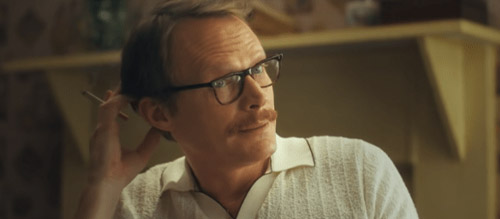Uncle Frank (2020) Review
Uncle Frank (2020)
Director: Alan Ball
Screenwriter: Alan Ball
Starring: Paul Bettany, Sophia Lillis, Peter Macdissi, Steve Zahn, Judy Greer, Margo Martindale, Stephen Root
Infamous for its outdated religious ethics and close-minded conservative politics, the American South can be a profoundly frightening place. With his newest film, Uncle Frank, Alan Ball (American Beauty) precisely captures the hostility of the South toward those who do not fit into its rigid set of standards. Set in 1970s Creeksville, North Carolina, the film follows the titular Frank (Paul Bettany), a closeted gay man who has become ostracised from his old fashioned, southern family, and his relationship with his young niece, Beth (Sophia Lillis), who looks to her Uncle for guidance and inspiration.
United as family outcasts and kindred spirits, Frank encourages a young Beth to be her own person and to pursue an education away from the small-town restrictions of life in Creeksville. Years later, after being accepted to the New York college where Frank works as a Literature professor, Beth pays a surprise visit to his Manhattan apartment, where she is surprised to find Walid (Peter Macdissi), a bearded man who introduces himself as Frank’s roommate, rather than Frank’s obviously fake girlfriend. With Walid desperate to get to know a member of his family, Frank later comes out to Beth, admitting that Walid has been his partner for ten years.
The trio has some time to bond and swap stories before they are interrupted by a phone call bearing bad news: Frank’s Father ‘Daddy Mac’ (played with loathsome brutality by Stephen Root) has passed away. Having been consistently bullied and shunned by his Dad, Frank is reluctant to make the journey back home for the funeral. However, encouraged by Walid to have faith in his family, Frank sets off on a cross-country road-trip with Beth. Along the way, shaken by the pressure and significance of the journey, Frank begins to mentally revisit the traumas of his past, and drift towards the numbing companionship of alcohol.
In attempting to juggle a coming-of-age tale with a family melodrama and a road-trip, Ball often loses the direction of his narrative. With so much to contend with, and little space to explore the emotional significance of Frank’s journey, scenes intended to strike a chord with audiences appear dulled and underworked. In framing the events through Beth’s journey into maturity, Ball, unfortunately – while neither as egregious nor witless – often stumbles into Green Book territory. With so much skin-deep and trite material to work with, Bettany’s Frank slips into the role of a ‘Magical Homosexual’ whose job it is to spoon-feed homosexuality to straight people in doses they can manage. With many ideas struggling to translate upon a shifting spectrum of genre, much of Uncle Frank merely pays lip service to the hardships and sacrifices of gay people rather than deliver an intelligent reflection of Southern family life for the LGBTQ+ community.
Ball often delivers his narrative through rose-tinted glasses, with many of his characters displaying baffling, almost insulting naivety. Walid, being an immigrant from Saudi Arabia, is no stranger to the danger and persecution gay men face. Yet, he brushes off Frank’s legitimate fears regarding returning to his home town with his bright, overly confident attitude, thwarting Frank’s instruction that he should stay away from the South for his own safety. Despite frequently educating those around him to the dangers for gay men in his home country (beheading, disownment, beatings), it’s difficult to buy that Walid would disregard Frank’s warnings with such blasé conviction. Other areas of the script also share this functional mentality: the decision to embark on a road trip comes about because Beth’s Mother has a fear of planes and forbids her from boarding one. Other characters who consistently display racist and ignorant attitudes, with the tyrant Father now dead and buried, undergo sudden and unprompted Disneyesque personality transformations, insinuating that problematic family members can change if you close your eyes and wish hard enough.
Despite this occasionally problematic plot, Paul Bettany works well with the material, conveying a believable and robust performance. He delivers Frank as a multifaceted human being, giving him depth and well-constructed layers. Bettany treats Frank’s trauma respectfully and tentatively, and his fear of being shunned by the family he loves dearly rests underneath his every word; his pain and sacrifice are felt keenly throughout. Sophia Lillis (I Am Not Okay With This) delivers another expertly executed performance, proving once again that she can work well and consistently across genres. Other stand-outs are Peter Macdissi as Walid, lovingly nicknamed Wally, who glows with genuine warmth and sincerity, acting as a steadfast pillar of strength for Frank and Beth, and Margo Martindale, who delivers a pitch-perfect Southern-style Mammaw.
While Uncle Frank does occasionally trip itself up, when the film begins to take stride, tenderly crafted pockets of emotion come into the forefront. When the film is at its best, it speaks to the love and support gay people find outside of their biological families, proclaiming that bloodline does not equal family; families are what you make them. For a film so aware of the issues it sets out, it’s a crying shame that it should so frequently choose fairy tale fabrication over substantial thought.
12/24


